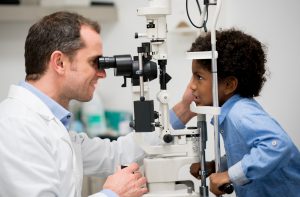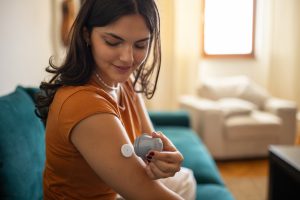 This month, we are proud to shine our Employee Spotlight on Denise Roman, PT, DPT, PPS coordinator and a PT supervisor in the department of physical medicine and rehabilitation.
This month, we are proud to shine our Employee Spotlight on Denise Roman, PT, DPT, PPS coordinator and a PT supervisor in the department of physical medicine and rehabilitation.
Denise has been at Jamaica Hospital Medical Center for 34 years. She was born and raised in Georgetown, Guyana. Denise attended Fountain A.M.E and St. Mary’s primary schools, and the Bishop’s High School. After graduating from high school, Denise traveled to Jamaica, West Indies where she studied and received her degree in Physical Therapy at the School of Physical Therapy on the Mona campus of the University of the West Indies. In 1989, Denise immigrated to the United States. She continued her studies at the Empire College, receiving a BS in Community and Human Services. Denise then went on to receive a post graduate certificate in Early Intervention from the Westchester Medical College and a Doctorate in Physical Therapy from Utica College.
Denise currently resides in Springfield Gardens. She loves pets and while living in Guyana she had many, but currently doesn’t have any. In her free time she enjoys reading and volunteering with youth programs at her church. Denise has also volunteered with Habitat for Humanity. She believes that volunteering and giving back to the community are very important qualities. Denise has never forgotten the people who have helped her along the way and she feels that that she always wants to do her best to be of service to others.
Denise has traveled extensively and some of the places she has visited are Europe, and the Caribbean Islands. Of course, Guyana is one of her favorite places to visit. Denise enjoys many different types of food, especially West Indian, Mexican and Asian. Her favorite types of music to listen to are gospel, reggae, soca, R&B, jazz and folk. Denise enjoys watching cricket, and track and field. She played netball in school and likes outdoor activities that include walking, parasailing, and white water rafting.
Denise loves working at Jamaica Hospital as it has allowed her to grow professionally and has given her the opportunity to watch the hospital expand . She is proud of the fact that her colleagues work together as a team to ensure the best possible outcomes for our patients. This was very evident during the COVID pandemic as the staff continued to give their best despite the dangers of the disease and being mentally and physically challenged. Denise was very thankful for the care her mother received while being a patient at the hospital and credits the staff for saving her life. We are very proud to have Denise as a member of our team and we look forward to her continuing to work with us for many more years to come.
All content of this newsletter is intended for general information purposes only and is not intended or implied to be a substitute for professional medical advice, diagnosis or treatment. Please consult a medical professional before adopting any of the suggestions on this page. You must never disregard professional medical advice or delay seeking medical treatment based upon any content of this newsletter. PROMPTLY CONSULT YOUR PHYSICIAN OR CALL 911 IF YOU BELIEVE YOU HAVE A MEDICAL EMERGENCY.









